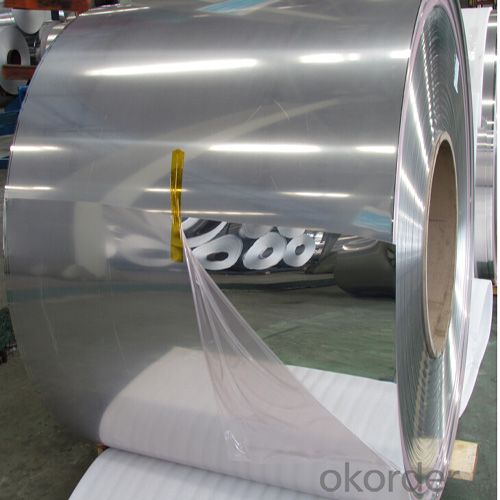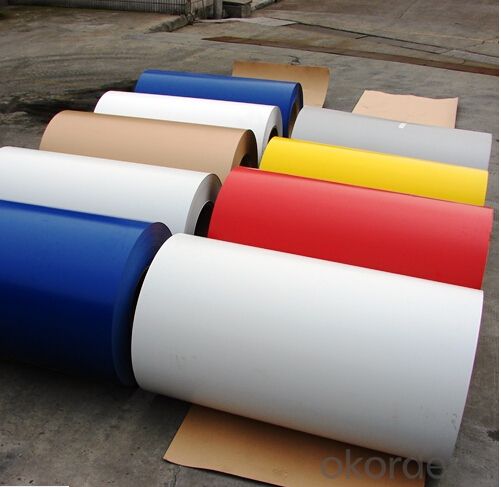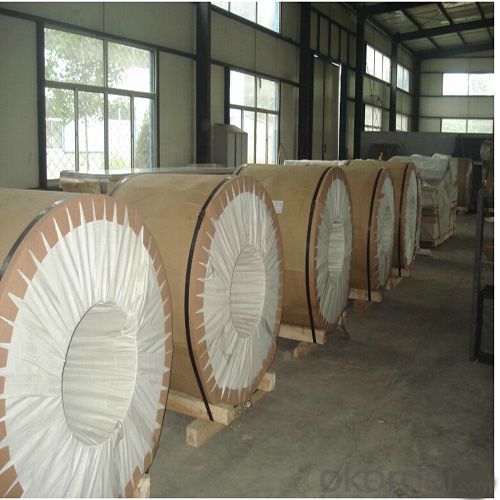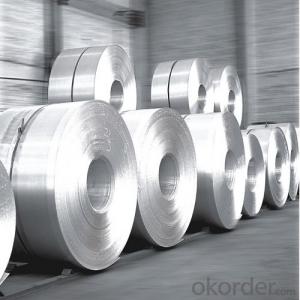Aluminum Coil 3003 for Truck Bodies with Competitive Price
- Loading Port:
- Shanghai
- Payment Terms:
- TT OR LC
- Min Order Qty:
- 5 m.t
- Supply Capability:
- 10000 m.t/month
OKorder Service Pledge
OKorder Financial Service
You Might Also Like
Item specifice
1.Structure of Aluminum Coil 3003 for Truck Bodies Description:
Aluminum alloys 1xxx series, 2xxx series, 3xxx series, 5xxx series, 6xxx series and 8xxx series. They are available in various sizes with thicknesses from 0.1mm to 500mm, widths from 10mm to 3, 000mm andlengths below 12m. Aluminium coil 3003 Mainly used in signs, billboards, building exterior decoration, bus body, high-rise buildings and factories wall decoration, kitchen sink, lamp, fan leaves, with pieces of electronic, chemical equipment, sheet metal processing parts, deep drawing or spinning hollowware, welding parts, heat exchangers, bell surface and disk,plate, kitchenware, decorations, reflective devices, etc
2.Main Features of Aluminum Coil 3003 for Truck Bodies:
High temperature resistant nano color coated aluminum coil
Weathering resistant pre painted aluminum plate
Scrubbing resistant pre painted aluminum roll
3. Aluminum Coil 3003 for Truck Bodies Images:



4. Aluminum Coil 3003 for Truck Bodies Specification:
| Aluminum Alloy: | AA1100,1050,3003,3004,3005,3105,5005,O-H112,ETC. |
| Temper: | H16,H18,H22,H24,H26,H28 |
| Aluminum Alloy Thickness: | 0.08mm~1.2mm(0.08,0.18,0.28,0.38,0.48,0.6,0.8,1 mm) |
| (0.1,0.15,0.25,0.35,0.45 mm) | |
| Coil Width: | 30~1520mm pre painted aluminum coil for Truck body |
| Core Diameter: | 150/405/505mm |
| Coil Weight: | 1~2.5tons each coil |
| Coating Type: | PE,PVDF,back coatting,ACRYLIC,feve |
| Surface Type: | Smooth,Embossed,mill finish,coated,brushed,etc. |
| Glossness: | 10-90%(EN ISO-2813:1994) |
| Coating Thickness: | PE:more than 18 +-1micron |
| PVDF:more than 25+-1micron | |
| Back Coating:8~10+-1micron |
5.FAQ
Q1.How long have you been in this product?
A1:More than 10 years.
Q2. What's the minium quantity(MOQ)?
A2. 5 Metric tons
Q3. How long is shipping time?
A3. 7 (ready-made products)-25 days(OEM)
Q4. How do you guarantee the quality?
A4. 1. Cooperating and Exchaning experience with sevral quoted aluminum companies
2. Japanese and Swiss production line and skilled works (regular training and testing)
3. more than 10 years production experience.
Q5. Do you have after sale service?
A5. Yes. Any quality problem occurs within one year, pls take photoes,we will be responsible.
- Q:Are there any specific regulations or standards for aluminum coil production?
- Aluminum coil production is subject to specific regulations and standards that exist to guarantee the quality, safety, and sustainability of the process. The American Society for Testing and Materials (ASTM) International standard, specifically ASTM B209, is a crucial standard for aluminum coil production. This standard outlines the necessary chemical composition, mechanical properties, and technical requirements that aluminum coils must adhere to. Aside from ASTM standards, regulatory bodies like the International Organization for Standardization (ISO) and the Occupational Safety and Health Administration (OSHA) also establish regulations and standards. ISO 9001 is a widely recognized standard for quality management systems, while ISO 14001 focuses on environmental management systems. These standards provide guidance and requirements to ensure quality, environmental responsibility, and worker safety during the production process. Moreover, it's important to note that specific regulations may vary depending on the country or region. For instance, in the United States, the Environmental Protection Agency (EPA) oversees emissions and waste disposal related to aluminum coil production through the Clean Air Act and the Resource Conservation and Recovery Act (RCRA). These regulations aim to minimize the environmental impact associated with the production process. Overall, the purpose of these regulations and standards is to uphold the quality, safety, and environmental sustainability of the aluminum coil production industry. Manufacturers must comply with these regulations and standards to ensure that their products meet the necessary specifications and are produced in a responsible manner.
- Q:What are the factors that affect the cost of aluminum coils?
- There are several factors that can affect the cost of aluminum coils. 1. Raw material costs: The cost of aluminum, which is the primary material used in manufacturing coils, can fluctuate based on global supply and demand as well as market conditions. Changes in the price of aluminum can have a direct impact on the cost of aluminum coils. 2. Manufacturing process: The production process involved in making aluminum coils can also impact their cost. Various techniques such as casting, rolling, and annealing are used, and each method has its own associated costs. The complexity and efficiency of the manufacturing process can influence the final price of the coils. 3. Size and specifications: The size, thickness, and specifications of the aluminum coils can affect their cost. Larger coils or coils with specific dimensions may require additional raw materials, processing time, or specialized equipment, which can contribute to higher costs. 4. Surface finish: The type of surface finish applied to the aluminum coils can also impact their cost. Coils with a higher-quality finish, such as brushed or coated surfaces, may be more expensive due to the additional processing and materials required. 5. Quantity and order volume: The volume of aluminum coils ordered can often impact the cost. Larger order quantities may lead to economies of scale, resulting in lower unit costs. Conversely, smaller orders or customized specifications may incur additional setup costs or higher per-unit prices. 6. Market competition: The level of competition in the aluminum coil industry can affect pricing. If there are numerous manufacturers offering similar products, prices may be more competitive as companies strive to attract customers. On the other hand, if there are limited suppliers or unique product offerings, prices may be higher due to reduced competition. 7. Transportation and logistics: The cost of transporting aluminum coils can also influence their overall price. Factors such as distance, mode of transportation, and fuel prices can impact shipping costs, which in turn can be passed on to customers. It is important to note that these factors are not exhaustive and can vary depending on the specific circumstances and market dynamics. Additionally, other external factors such as taxes, tariffs, and government regulations can also affect the cost of aluminum coils.
- Q:What are the different types of aluminum coils available?
- The market offers a variety of aluminum coils with different types. Each type is specifically designed to meet certain requirements and purposes. 1. Mill Finish Aluminum Coils: These coils have a smooth and glossy surface without any additional treatments or finishes. They are commonly used in general applications where appearance is not a major concern. 2. Anodized Aluminum Coils: Anodizing is an electrochemical process that forms a protective layer on the aluminum surface. This type of coil is highly resistant to corrosion and offers great durability. It is widely used in architectural applications like building facades, window frames, and signage. 3. Painted Aluminum Coils: These coils are coated with a layer of paint, usually through a coil coating process. The paint not only enhances the appearance but also provides protection against weathering, UV radiation, and corrosion. Painted aluminum coils are extensively used in the construction industry for roofing, cladding, and rainwater goods. 4. Embossed Aluminum Coils: These coils have a textured or patterned surface created by embossing rollers. The patterns range from simple designs to intricate motifs, providing both aesthetic appeal and improved slip resistance. Embossed aluminum coils find applications in flooring, decorative panels, and transportation. 5. Pre-painted Aluminum Coils: Similar to painted coils, pre-painted aluminum coils are coated with paint. However, the coating is applied before the coil is formed, allowing for more color options and finishes. Pre-painted aluminum coils are widely used in industries like automotive, appliance manufacturing, and signage. 6. Clad Aluminum Coils: Clad aluminum coils consist of two layers of aluminum bonded together, typically through rolling or extrusion. The purpose of cladding is to combine the desirable properties of different aluminum alloys, such as strength, corrosion resistance, or conductivity. Clad aluminum coils are commonly utilized in the automotive, aerospace, and electrical industries. Apart from these types, there are also specialized aluminum coils available for specific applications such as heat exchangers, condenser coils, and transformer windings. These coils are designed with particular properties and characteristics to satisfy the requirements of these specific applications.
- Q:I am trying to electropolish the surface of a 3003 aluminum sample to analyze in the SEM. I was wondering if anyone knew what electrolyte and electropolishing paramaters work for this alloy. So far I have used phosporic+ethanol+water at 50V for 2 minutes with minimal success.
- Aluminium needs deoxidizing also called as desmutting after electropolishing. This is done in a hot chromic acid bath for nearly for 5 minutes.
- Q:Can aluminum coils be used in food processing equipment?
- Yes, aluminum coils can be used in food processing equipment. Aluminum is a popular choice for food-related applications due to its many desirable properties. It is lightweight, corrosion-resistant, and has excellent thermal conductivity. These characteristics make aluminum coils suitable for use in food processing equipment such as refrigerators, freezers, ovens, and heat exchangers. Additionally, aluminum is non-toxic and does not react with food, making it a safe material for direct contact with edible products. However, it is important to ensure that the aluminum used in food processing equipment meets the required food safety standards and regulations to prevent any potential contamination.
- Q:Are aluminum coils suitable for pharmaceutical vial caps?
- Pharmaceutical vial caps can indeed be made from aluminum coils. When it comes to pharmaceutical packaging, aluminum is highly favored thanks to its exceptional barrier properties. These properties effectively shield the vials' contents from moisture, oxygen, and other harmful substances. Aluminum coils can be easily molded into caps of various sizes and shapes, accommodating different types of vials. Another advantage is that aluminum is a lightweight material, which makes transportation and handling hassle-free. Additionally, aluminum is resistant to corrosion, ensuring that the vial caps remain intact throughout storage and usage. In summary, due to their barrier properties, versatility, and durability, aluminum coils are a suitable option for pharmaceutical vial caps.
- Q:What is the corrosion resistance of aluminum coils in saltwater environments?
- Saltwater environments do not pose a problem for aluminum coils as they possess outstanding resistance to corrosion. This is primarily due to the creation of a protective oxide layer on the aluminum surface, effectively acting as a shield against corrosion. By forming a barrier, this oxide layer prevents direct contact between the aluminum and saltwater, significantly reducing the likelihood of corrosion. Furthermore, aluminum itself has inherent resistance to saltwater corrosion as it is a relatively inert metal. Consequently, aluminum coils are widely utilized in various marine applications, including boat hulls, offshore structures, and saltwater cooling systems. Nevertheless, it is crucial to acknowledge that prolonged exposure to saltwater can still result in some degree of corrosion over time. To enhance the durability and performance of aluminum coils in saltwater environments, regular maintenance and suitable protective coatings are advised.
- Q:Can aluminum coils be used for heat transfer applications?
- Yes, aluminum coils can be used for heat transfer applications due to their excellent thermal conductivity properties.
- Q:Are aluminum pie pans and aluminum foil considered green products? They are most certainly recyclable. Thanks.?
- Surely that depends on how 'green' you want to be. There's the 'end user green' which just says, 'well this is recyclable so it's green', or there's the whole subject of whether we should be encouraging throw away products which rely on unsustainable minerals or rock such as the bauxite that is used to make aluminium (aluminum). And what would be the effect if we said no more aluminium, and bauxite was no longer allowed to be mined? What happens to those people who earn a living from mining it, and what do we replace it with? Green is a very complicated concept!
- Q:What are the manufacturers of color coated aluminium rolls made of aluminium in Jiangsu?
- Products are widely used in high-end architectural curtain walls and interior and exterior wall decoration, roofing systems, materials, food packaging, home appliances and other fields. Our products are of high quality, bright colors, complete specifications, and can meet the different needs of customers.
1. Manufacturer Overview |
|
|---|---|
| Location | |
| Year Established | |
| Annual Output Value | |
| Main Markets | |
| Company Certifications | |
2. Manufacturer Certificates |
|
|---|---|
| a) Certification Name | |
| Range | |
| Reference | |
| Validity Period | |
3. Manufacturer Capability |
|
|---|---|
| a)Trade Capacity | |
| Nearest Port | |
| Export Percentage | |
| No.of Employees in Trade Department | |
| Language Spoken: | |
| b)Factory Information | |
| Factory Size: | |
| No. of Production Lines | |
| Contract Manufacturing | |
| Product Price Range | |
Send your message to us
Aluminum Coil 3003 for Truck Bodies with Competitive Price
- Loading Port:
- Shanghai
- Payment Terms:
- TT OR LC
- Min Order Qty:
- 5 m.t
- Supply Capability:
- 10000 m.t/month
OKorder Service Pledge
OKorder Financial Service
Similar products
New products
Hot products
Hot Searches
Related keywords






























